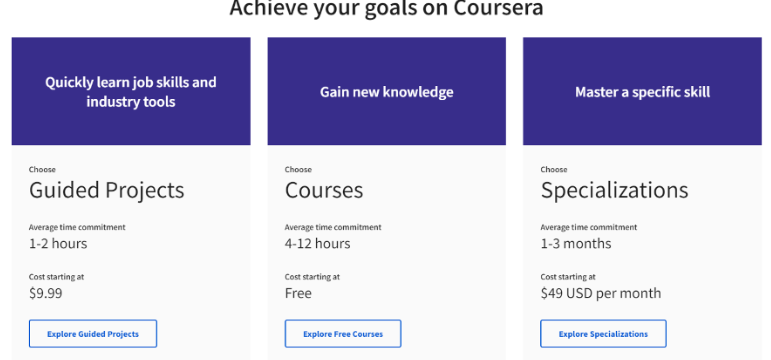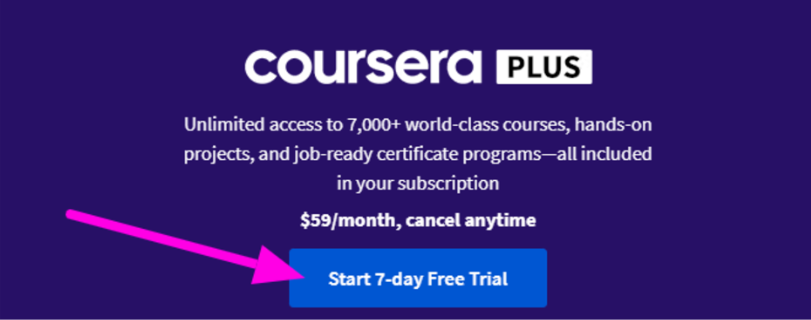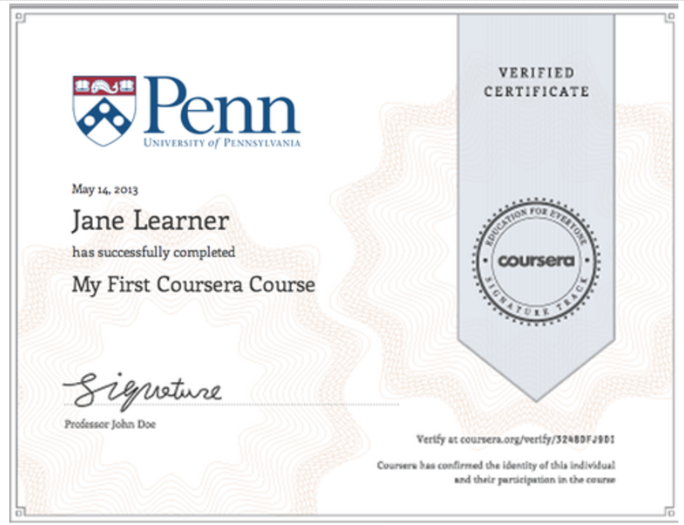Coursera Plus gives you unlimited access to over 10,000 courses, while with regular Coursera, you pay for each course individually.
If you’re planning to earn just one or two certificates, paying per course, usually between $49 and $79, might be the better option. But if you’re looking to switch careers, build a strong resume with multiple certifications, or develop a wide range of skills, the Coursera Plus subscription at $399 per year can offer much greater value.
In this comparison, I’ll walk you through the main differences, pricing details, and advantages of each option, and help you figure out which one fits your learning goals best. That way, you can make a smart choice and get the most out of your online learning experience.

Get 40% OFF On Coursera Plus
Buy Coursera Plus annual subscription at just $399 and get a flat 40% discount.
In this detailed comparison, I will break down pricing, course options, certificate benefits, and overall cost-effectiveness to help you determine whether Coursera or Coursera Plus is better for your education and career needs.
Coursera vs Coursera Plus: In A Nutshell
Understanding the Basic Differences between Coursera’s offerings highlights distinct pricing structures.
Coursera’s standard platform allows for individual course purchases starting at $49, while Coursera Plus provides a subscription model at $59 per month or $399 annually.
What Coursera Offers?
The standard Coursera platform allows learners to access individual courses, specializations, and degree programs.
Each course purchase provides lifetime access to materials and one certificate upon completion. This approach works well for focused learning in specific areas.

What Coursera Plus Offers?
Coursera Plus, on the other hand, opens up access to over 7,000 courses from prestigious institutions worldwide. The subscription includes unlimited certificates, making it particularly attractive.
All Coursera Plus courses come with comprehensive materials, though access expires when the subscription ends.

Coursera vs. Coursera Plus: Differences
The choice between individual courses and Coursera Plus typically depends on how many courses you plan to take. Coursera Plus becomes cost-effective if you intend to complete multiple courses within a year.
Here are a few other important differences between Coursera vs. Coursera Plus:
| Features | Coursera (Individual Courses) | Coursera Plus (Subscription) |
|---|---|---|
| Course Access | Limited to the course you purchase | Unlimited access to 10,000+ courses & specializations |
| Pricing | Pay-per-course ($49–$79 on average) | $59/month or $399/year |
| Certificates | Must be purchased separately per course | Unlimited certificates |
| Learning Flexibility | Yes | Yes |
| Best For | Learners needing 1-2 courses | Lifelong learners, professionals, and career changers taking multiple courses |
| Financial Aid & Discounts | Available for some individual courses | Available on some courses |
Note: Access to course materials remains valid as long as your Coursera Plus subscription is active.
Coursera vs Coursera Plus Cost
When evaluating Coursera vs Coursera Plus cost, the math becomes clearer for different types of learners. Someone taking multiple courses throughout the year could save substantially with Coursera Plus’s flat fee structure.
For instance, taking three specializations, which might individually cost $49 monthly for 4-6 months, could cost more than the annual Coursera Plus subscription.
Here is how much you have to spend on Coursera and Coursera Plus, respectively:
| Plan | Cost | Billing Type |
|---|---|---|
| Coursera (Individual Courses) | $49–$79 per course (on average) | One-time payment |
| Coursera Plus (Monthly Plan) | $59 per month | Recurring monthly |
| Coursera Plus (Annual Plan) | $399 per year | Recurring yearly |

Get 40% OFF On Coursera Plus
Buy Coursera Plus annual subscription at just $399 and get a flat 40% discount.
Coursera Free Trial
Only Coursera Plus offers a 7-day free trial, allowing learners to explore the platform’s full capabilities before committing. This trial period includes access to virtually all Coursera Plus courses and the ability to earn certificates, making it a risk-free way to evaluate the platform’s value.

Benefits Of Coursera Vs Coursera Plus
The main advantage of Coursera is that if you buy the whole course, you can have lifetime access to the course and material.
One of the most significant benefits of Coursera Plus is the unlimited certificate feature. Coursera Plus includes certificates, which are awarded after you finish each course without additional fees.

This makes it particularly valuable for professionals looking to enhance their resumes with multiple certifications. The certificates are identical to those earned through individual course purchases and carry the same weight with employers.
Coursera Vs Coursera Plus Limitations
Coursera or buying a single course is not feasible whenever you want to do a Google certification or other such prestigious group of courses. Similarly, a few other limitations of Coursera are:
- No unlimited certificates
- No Free Trial
While Coursera Plus provides extensive access, it doesn’t include everything, such as:
- Degree programs
- Certain professional certificates
- Lifetime access to course material
Coursera Vs Coursera Plus: Which One Is For You?
Coursera Plus presents compelling value for ambitious learners planning to take multiple courses. The ability to switch between courses freely, earn unlimited certificates, and access a vast content library often justifies the subscription cost.
However, casual learners might find better value in purchasing individual courses via Coursera.
Tips To Select The Best Between Coursera And Coursera Plus
- Number of courses: Few courses? Use Coursera. Many courses? Choose Coursera Plus.
- Budget: Check if paying per course or subscription fits your budget.
- Certificates: Certificates matter; Coursera Plus offers unlimited certificates.
- Course availability: Not all courses included; verify availability first.
- Learning duration: Coursera Plus for long-term; Coursera for short-term learning.
- Career goals: Coursera Plus suits ongoing growth; Coursera for specific skills.
- Subscription: Coursera Plus needs a plan; Coursera pays per course.
Suggested Reads:
Conclusion: Coursera Plus Offers More Value for Most Learners
Deciding between Coursera’s pay-per-course option and Coursera Plus really comes down to how you like to learn and what your goals are. If you just want to take one or two courses, buying them individually, usually around $49 each, is an easy and affordable choice.
But if you’re planning to take several courses, earn multiple certificates, or explore different subjects throughout the year, Coursera Plus is a better deal. For $59 a month or $399 a year, you get unlimited access to over 10,000 courses and guided projects, plus you can try it risk-free with a 7-day free trial and a 14-day refund option.
In short, Coursera works well for focused, one-time learning, while Coursera Plus is perfect for those who want to keep growing their skills without worrying about extra costs. Think about your learning goals, how much time and money you want to invest, and pick the option that fits you best.

Get 40% OFF On Coursera Plus
Buy Coursera Plus annual subscription at just $399 and get a flat 40% discount.
FAQs
Unlimited access to 7,000+ courses, unlimited certificates, and cost savings for active learners taking multiple courses throughout the year.
$59 monthly or $399 annually, with occasional discounts and a 7-day free trial period.
Access to over 7,000 courses simultaneously, with no limit on how many you can take during your subscription.
Platforms like edX and Udacity offer alternatives, but Coursera remains one of the most comprehensive options for accredited courses.
Degree programs are not included in Coursera Plus and require separate enrollment and payment.

I’m Ishan from Toronto, dedicated to simplifying online education choices. I explore and review eLearning platforms and courses. My insights are shared on “Enlightened Learning,” helping learners make informed decisions. Passionate about making education accessible and engaging for all.
